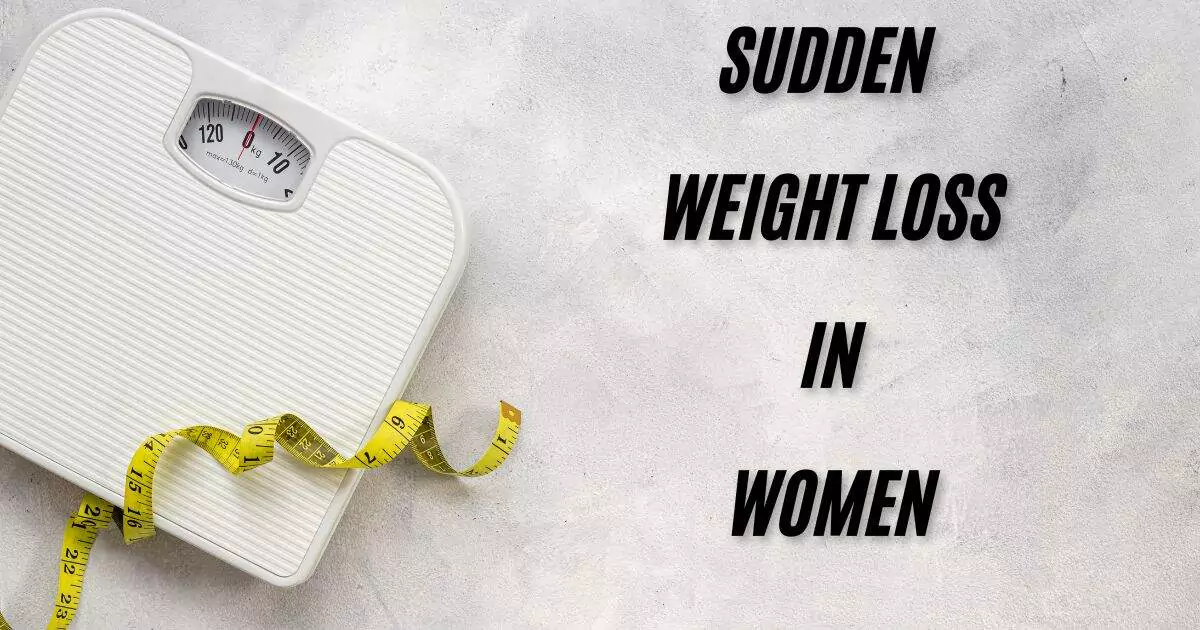Introduction
Unexplained or sudden weight loss in women mostly in older females can be a signal of deeper health issues. Noticeable weight loss of 5% of body weight unintentionally without trying consciously in 6 to 12 months can cause underlying health conditions.
This blog will explore the causes and management of sudden weight loss in women.
Read More: Discover The Top 5 Yoga Mudra For Weight Loss
Causes of Sudden Weight Loss in Women
Sudden weight loss in women can be alarmingly caused by a variety of factors ranging from lifestyle changes to chronic medical illnesses. Many health conditions like hyperthyroidism, gastrointestinal issues, or diabetes start with weight loss. Overlooking this symptom may delay the diagnosis and treatment, worsening the health condition.
1. Hyperthyroidism
Hyperthyroidism, or an overactive thyroid, is a medical condition that causes an increased metabolic rate, resulting in higher caloric burn.
Hyperthyroidism stimulates the breakdown of both fat and muscle to meet the body’s increased energy demands, contributing to weight loss and muscle weakening.
2. Diabetes
When your diabetes is not managed well, your body cells are unable to use glucose properly which leads to the burning of fat cells and muscles in your body for energy and leads to unintended weight loss.
3. Mental Health
Health conditions like depression or anxiety may lead to loss of appetite leading to nutritional deficiencies and resulting in weight loss. Women with mental health struggles are more often linked to report unexplained weight loss.
4. Crohn’s Disease
Crohn’s disease is an inflammatory bowel disease that causes chronic inflammation in the digestive tract damaging the mucosal lining. This lowers the ability to absorb essential nutrients leading to malnutrition and, weak immunity.
Common symptoms found in Crohn’s disease are nausea, abdominal pain, bloating, diarrhea, fatigue, and loss of appetite, further leading to weight loss.
5. Peptic Ulcer
Peptic ulcers are open sores in the lining of the stomach or duodenum, the upper part of the small intestine that often cause pain and discomfort while eating. The abdominal pain discourages regular food intake, resulting in gradual weight loss. This condition leads to reduced food intake resulting in unexplained weight loss.
One of the prominent symptoms of peptic ulcers is unexplained weight loss.
6. Addison’s Disease
Addison’s disease is a rare disease where the adrenal glands gradually get damaged and affect hormone production, cortisol, and aldosterone.
The common symptoms often seen in Addison’s disease are chronic fatigue, poor appetite, loss of muscle mass, nausea and vomiting, and diarrhea, leading to weight loss.
7. Pancreatitis
Pancreatitis is a health condition in which the pancreas, a vital organ that produces digestive enzymes and regulates blood sugar levels, becomes inflamed, resulting in acute or chronic inflammation.
Weight loss is a common symptom in acute and chronic pancreatitis. Due to inflammation, the pancreas’s normal functioning is altered resulting in poor digestion, malnutrition, metabolic changes, and reduced appetite contributing to weight loss.
8. Cancer
Unintentional weight loss is often linked to cancer. The metabolic changes due to cancer result in greater energy consumption and muscle breakdown.
Weight loss is commonly found in lung cancer and upper gastrointestinal cancer such as stomach cancer, pancreatic cancer, food pipe cancer, small bowel cancer, liver cancer, and gallbladder cancer.
Cancer causes malabsorption and loss of appetite, leading to nutritional deficiency and weight loss.
9. HIV (Human Immunodeficiency Virus)
One of the common symptoms of HIV-positive individuals is unexplained weight loss with poor nutrition absorption.
HIV patients are more prone to infections like tuberculosis, oral thrush, and gastrointestinal tract infections accompanied by chronic weakness.
People with HIV may also experience loss of appetite, nausea, fatigue, depression, mouth sores, and chronic diarrhea causing nutrient loss.
10. Parasitic Infection
Parasites can be the cause of sudden weight loss in women. Parasitic infection may cause symptoms like abdominal pain, bloating, nausea or vomiting, dehydration fatigue, diarrhea, and loss of appetite leading to weight loss.
11. Lung Disease
Lung diseases like COPD (Chronic Obstructive Pulmonary Disease), Lung cancer, Pulmonary Fibrosis, and Tuberculosis (TB) are often linked with weight loss.
Unintentional weight loss with symptoms such as shortness of breath, fatigue, and persistent cough should be evaluated to check for the presence of any lung disease.
Weight Loss Management
If you are having symptoms of diarrhoea or vomiting hydrate yourself by drinking enough water and rehydrating liquids.
Have small and frequent meals rather than eating 3 big meals.
Choose nutritious food or tailored diet plans to provide essential nutrients to your body that help to restore energy and maintain overall health.
Treat the underlying health condition, the root cause of weight loss.
Consume easily digestible food options like soups, oatmeal, bananas, and rice.
Physical activities like walking and yoga can improve your physical and mental health.
Conclusion
One should not ignore the sudden weight loss symptoms. Early identification of sudden weight loss in women can lead to early diagnosis and proper medical treatment.
Although weight loss may happen sometimes due to stress or lifestyle changes, it may also signal serious disease that needs to be taken care of.
Early medical interventions, treating the root cause, and proper diet management can help reverse weight loss, optimize nutrition, and improve overall health.
FAQ’s
Q1. Is 4 kg weight loss in a month good?
Ans: Steady weight loss of 0.4 to 1 kg weekly is considered healthy. Weight loss beyond that needs to be taken care of.
Q2. How much weight loss is unhealthy?
Ans: Unintentional weight loss of more than 5% of your body weight in 6 to 12 months without effort or following any diet can be unhealthy.
Q3. When is a weight loss a red flag?
Ans: When Rapid weight loss is accompanied by any of the persistent symptoms such as constant fatigue, loss of appetite, weakness, nausea, vomiting, diarrhea, difficulty in swallowing, depression, anxiety, pain in the abdomen, or increased joint pain can be the cause for concern.
Q4. Does the thyroid lose weight?
Ans: When the thyroid is hyperactive it produces excess thyroid hormones increasing the metabolic rate, of your body resulting in weight loss.
Q5. What cancers cause rapid weight loss?
Ans: Studies suggest, that upper gastrointestinal cancer such as esophagus cancer, stomach cancer, small bowel cancer, pancreatic cancer, and liver cancer causes significant weight loss.
References
Understanding rapid weight loss in older women
Unintentional weight loss in older adults
https://my.clevelandclinic.org/health/symptoms/unexplained-weight-loss




